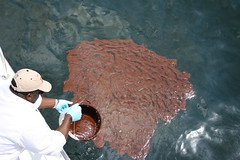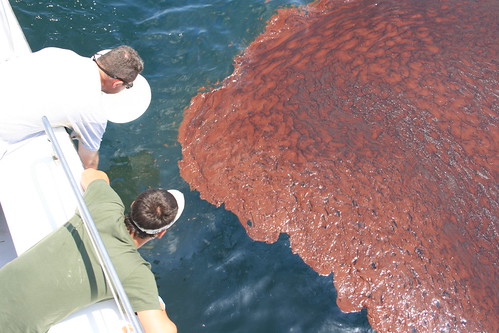
MOBILE, Ala. (Special) – Something wasn’t right with the sea.
Waves stopped. Smoothed out. The wind seemed not to affect the water in the same way. You could even feel it in the way “Riptide,” the hired fishing boat, reacted as it crossed into this new phenomenon in the Gulf of Mexico.
It became an eerie telltale sign to the three Texas Tech University researchers that they’d entered an oil slick.
“We started to see a change in the – it’s hard to explain – sort of a change in the choppiness in the water,” said Phil Smith, an associate professor at The Institute of Environmental and Human Health (TIEHH) at Texas Tech. “There was something different about it. It was smoother, almost like that certain area was shielded from the wind or something. We were all on the lookout for oil. We were hoping we’d be able to find some oil so we could collect samples to take back to Texas Tech.”
On a clear June 4 morning, Phil Smith, Ernest Smith and Mike Wages went to collect the last of their samples for testing. The sun shone brightly as a southwesterly breeze blew.
Getting out of the marina at Orange Beach proved difficult as the captain maneuvered through booms meant to keep oil out of Mobile Bay. Official-looking eyes watched closely as the fishing boat headed into waters closed to fishing by the federal government.
Had it not been for the continuing oil spill crisis, it would have been a great day to go fishing on the Gulf. However, the calm, slick water wasn’t the only difference the team saw, Phil said. Throughout their trip, the team noticed an eerie absence of wildlife and people.
“We spent eight hours on water,” Phil said. “I saw only two birds. Two. I saw more helicopters than I did birds. We saw no fish. We saw no other boats. I would have expected far greater numbers of anything. Also, outside of boom operations near the shoreline, there were absolutely no cleanup efforts ongoing out at sea. That was a little bit shocking. I would think it would be easier to clean up before it hit the coast than after.
“It was very, very quiet.”
At six miles out, the captain reported smelling diesel fuel odor, but no oil appeared until the crew reached 13 miles from shore.
“As we were going out, we could see what I am calling the leading edge of this crude, which is the small tar balls like we had seen on the beach at Dauphin Island,” said Ernest, an associate professor at TIEHH. “You can clearly identify where oil or surfactant is on the water. Those areas were very smooth. Next to that area, you can see the wind breaking the waves. That would denote a difference in surface tension.”
The team came in contact with the largest tar mats at about 22 miles out, Ernest said. Altogether, they collected four five-gallon buckets of the rust colored crude, a few gallons of water from the smooth, calm areas covered with a rainbow sheen and containing smaller tar droplets, and a few gallons of plain seawater collected closer to shore, which they believed to be uncontaminated.
While on board, two members of the team got sick, Phil said.
“I can’t say it was because of the oil,” he said. “I was on the upper deck taking pictures and watching what Ernest and Mike were doing below. Mike got ill first. I didn’t really think that was that unusual. Then I sort of swapped out with those guys and collected a couple of buckets of oil samples. On the trip in, I got really sick and nauseous. I’ve been on boats all my life. I used to be a fishing guide, and I’ve never been seasick. This might have been the first time for me, or could have been the heat. But it also could have been something else.”
During the next few weeks, researchers at TIEHH will begin testing the samples to find out their composition, Ernest said.
“The No. 1 thing we want to do is help,” he said. “What is needed there is a significant amount of toxicology on human and animal health. I think the institute has a major role to play in the understanding of ecological and human health effects of this crude. In addition to that, I am interested in the socioeconomic impacts, and how this will play out both directly and indirectly.
“For me it’s important that the socioeconomics problems get some attention. Over the long term, if we ignore that, it will be just as devastating as the ecosystem. It definitely needs a voice.”

No comments:
Post a Comment